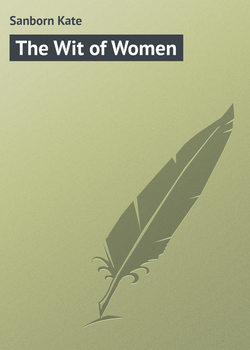Читать книгу The Wit of Women - Sanborn Kate - Страница 8
CHAPTER III
FROM ANNE BRADSTREET TO MRS. STOWE
ОглавлениеThe same gratifying progress and improvement noticed in the wit of women of other lands is seen in studying the literary annals of our own countrywomen.
Think of Anne Bradstreet, Mercy Warren, and Tabitha Tenney, all extolled to the skies by their contemporaries.
Mercy Warren was a satirist quite in the strain of Juvenal, but in cumbrous, artificial fashion.
Hon. John Winthrop consulted her on the proposed suspension of trade with England in all but the necessaries of life, and she playfully gives a list of articles that would be included in that word:
"An inventory clear
Of all she needs Lamira offers here;
Nor does she fear a rigid Cato's frown,
When she lays by the rich embroidered gown,
And modestly compounds for just enough,
Perhaps some dozens of mere flighty stuff;
With lawns and lute strings, blonde and Mechlin laces,
Fringes and jewels, fans and tweezer-cases;
Gay cloaks and hat, of every shape and size,
Scarfs, cardinals, and ribands, of all dyes,
With ruffles stamped and aprons of tambour,
Tippets and handkerchiefs, at least threescore;
With finest muslins that fair India boasts,
And the choice herbage from Chinesian coasts;
Add feathers, furs, rich satin, and ducapes,
And head-dresses in pyramidal shapes;
Sideboards of plate and porcelain profuse,
With fifty dittoes that the ladies use.
So weak Lamira and her wants so few
Who can refuse? they're but the sex's due."
Mrs. Sigourney, voluminous and mediocre, is amusing because so absolutely destitute of humor, and her style, a feminine Johnsonese, is absurdly hifalutin and strained.
This is the way in which she alludes to green apples:
"From the time of their first taking on orbicular shape, and when it might be supposed their hardness and acidity would repulse all save elephantine tusks and ostrich stomachs, they were the prey of roaming children."
And in her poem "To a Shred of Linen":
"Methinks I scan
Some idiosyncrasy that marks thee out
A defunct pillow-case."
She preserved, however, a long list of the various solicitations sent her to furnish poems for special occasions, and I think this shows that she possessed a sense of humor. Let me quote a few:
"Some verses were desired as an elegy on a pet canary accidentally drowned in a barrel of swine's food.
"A poem requested on the dog-star Sirius.
"To write an ode for the wedding of people in Maine, of whom I had never heard.
"To punctuate a three-volume novel for an author who complained that the work of punctuating always brought on a pain in the small of his back.
"Asked to assist a servant-man not very well able to read in getting his Sunday-school lessons, and to write out all the answers for him clear through the book – to save his time.
"A lady whose husband expects to be absent on a journey for a month or two wishes I would write a poem to testify her joy at his return.
"An elegy on a young man, one of the nine children of a judge of probate."
Miss Sedgwick, in her letters, occasionally showed a keen sense of humor, as, when speaking of a certain novel, she said:
"There is too much force for the subject. It is as if a railroad should be built and a locomotive started to transport skeletons, specimens, and one bird of Paradise."
Mrs. Caroline Gilman, born in 1794, and still living, author of "Recollections of a Southern Matron," etc., will be represented by one playful poem, which has a veritable New England flavor:
